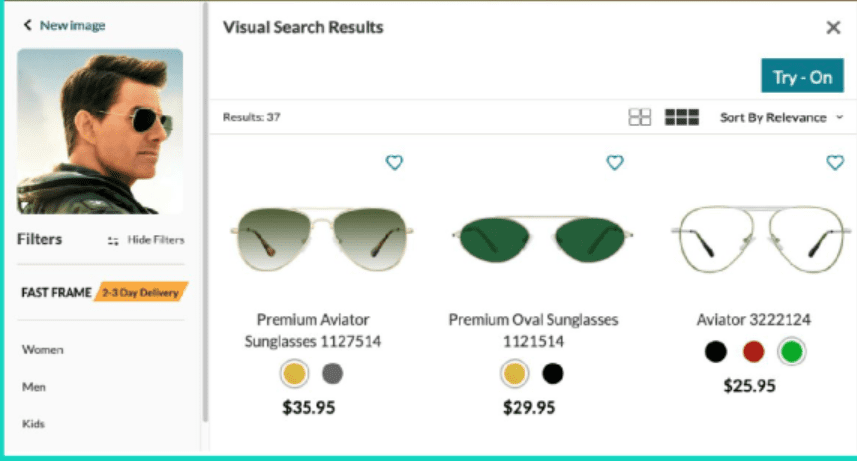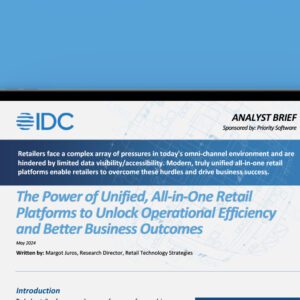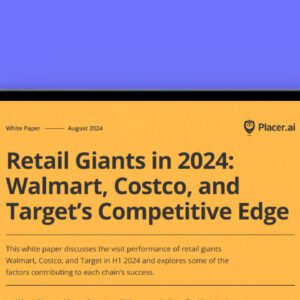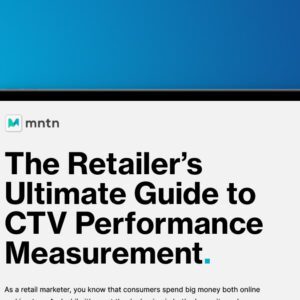Improving search functionality and response speed can be among the most powerful “behind the scenes” actions a retailer can take — particularly if they’re essentially a pureplay operation. Zenni Optical’s Chief Technology Officer (CTO) David Ting discovered just how powerful amping up the site’s search capabilities could be after the retailer deployed the Algolia solution in early 2023 and soon saw a 34% increase in revenue per search session.
While Ting praises Algolia’s technology and its people, he noted that Zenni Optical “did a lot of work to improve the relevance” of searches with the help of a proprietary AI-powered solution. The customization was needed because of the peculiarities involved in shopping for eyewear online, which is something Zenni knows quite a bit about: it’s sold more than 50 million frames since it was founded as a low-cost (but high-quality) eyewear retailer in 2003. Zenni, which does its own manufacturing to keep costs under control, still sells “a lot” of single-vision prescription glasses at a base price of $6.95 per pair, according to Ting.
Ting discussed the way search results influence consumer behavior as well as Zenni’s pilot with brick-and-mortar eyewear retailer U.S.Vision, which operates dispensaries in retailers including JCPenney, Boscov’s and Meijer. It’s all part of a digital transformation designed to “bring convenience to the end consumer by operating as a one-stop shop” for vision care, he noted.
Retail TouchPoints (RTP): What was the original reason for Zenni Optical to upgrade its search functionality with Algolia?
Advertisement
David Ting: The first reasons were response times, which are [now] extremely fast, and the fact that it’s always available everywhere. We knew how valuable that kind of “four 9’s” [99.99% uptime] availability is, since we had been doing the search hosting ourselves before this.
RTP: What kind of work did Zenni Optical need to do to make the results more relevant for your shoppers?
Ting: We built our own proprietary AI solution to improve the relevance of the results. For example, if you searched for our most popular item [by typing in] “black rectangular glasses,” with the out-of-the-box Algolia results you would have gotten [a page of] very similar-looking frames. With our AI, [the results are] a range of slightly different-looking frames — maybe they’re not exactly rectangular, or they’re a different shade or texture of black. We found that providing a little bit of variety [in search results] is a better formula. By changing the diversity of the result, even if the disparities of the first couple of frames shown is very high, the user can quickly find exactly the shape they’re looking for.
RTP: Are there factors in selling eyewear that present special search challenges?
Ting: Say someone is looking for a tortoise-shell frame. They might not know that it’s called that and just type in “brown with black spots.” Also, [our offerings for tortoise-shell] include a palette of 30 different color mixtures, which is another reason why responding with very different-looking frames is better than showing only one shade. There are also transparency and density differences [between different materials]. It’s one reason we have to have so much data to train the AI solution, so that people can find what they want.
RTP: How else is Zenni Optical dealing with the challenges users have with accurately describing products with words?
Ting: We’ve introduced visual search, which allows people to take a picture, upload an image or choose from pre-selected photos. It might be Tom Cruise and his aviators from Top Gun or BTS star Jimin Park’s sunglasses with gold earpieces. The “Find by Image” feature determines the most relevant frames and displays them. It’s a new, exciting technology and it offers a solution for customers who can’t remember the name of their frame. It also allows them to search for the frames they’ve seen on influencers, celebrities or even their own friends.
RTP: What happens if Zenni doesn’t have an exact match for the pair a celebrity is wearing?
Ting: We’re using the search data to help refine our sourcing, to do better with stocking and making things available. And while we’re known for affordability, if someone really wants a pair of Gucci frames, we want to carry it.
RTP: Zenni Optical has been online-only for years. What’s behind the pilot program with U.S.Vision?
Ting: We used to compete with eyecare professionals, who [for those that operate dispensaries] have a business model that requires them to charge a lot for eyeglasses, because they can only charge so much for doing an eye exam. But now — it was just launched in September 2023 — we have a pilot with U.S.Vision, providing them with a tech stack and using our online offerings, including our search functionality, to drive traffic to them. We’re already vertically integrated with our manufacturing and we want to try to do the same with brick-and-mortar, and we felt a partnership [made more sense] than us building stores.
RTP: What other changes do you foresee for Zenni Optical in 2024?
Ting: We’re going to offer contact lenses for the first time this year, because we want to be a one-stop shop and touch as many users as possible while trying to be best in class. We want to bring convenience to the end consumer. We’re also partnering with Visibly to be cleared to perform vision exams digitally on our site. We want to create the best of both worlds: the convenience of digital with the trust and safety of brick-and-mortar, and we’re finding the right balance with good partnerships.













